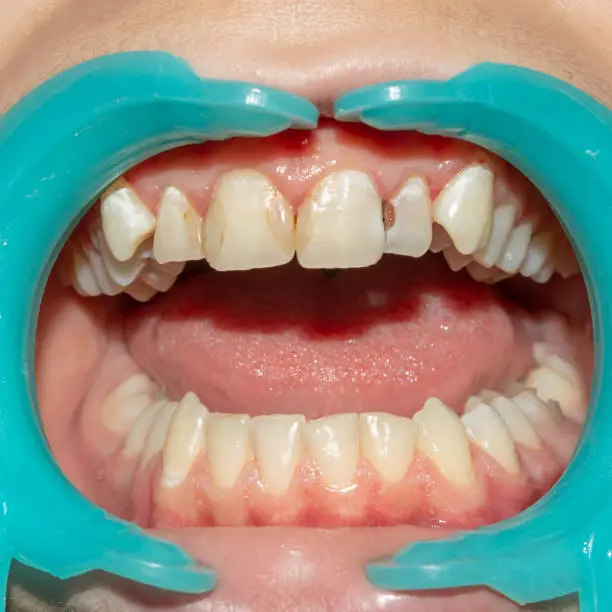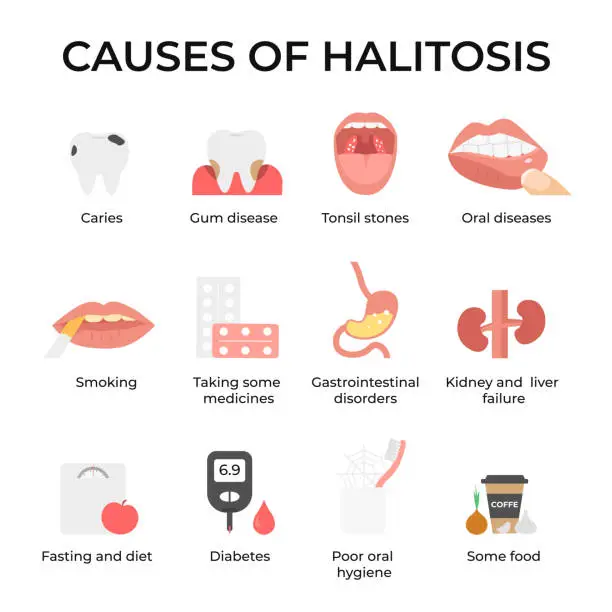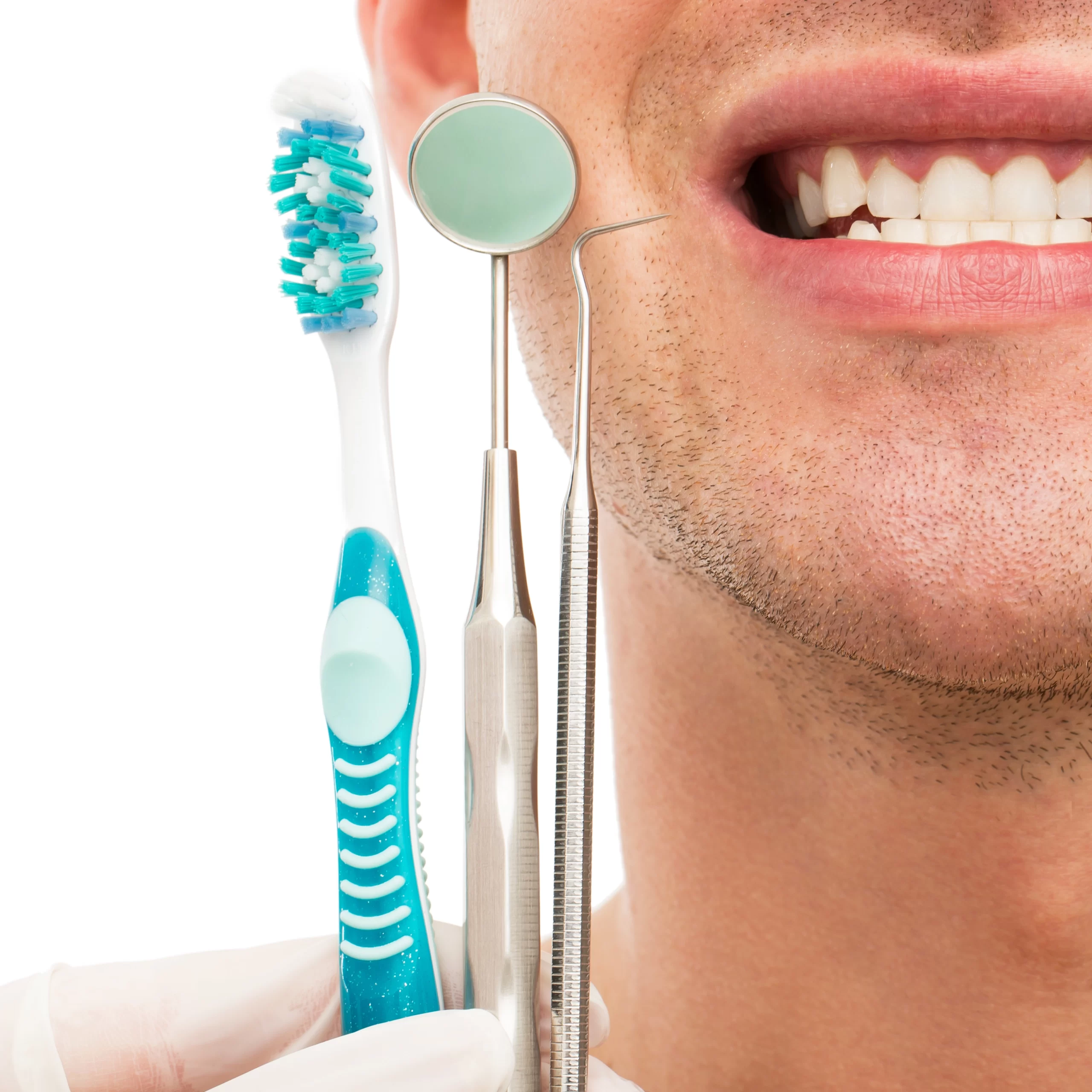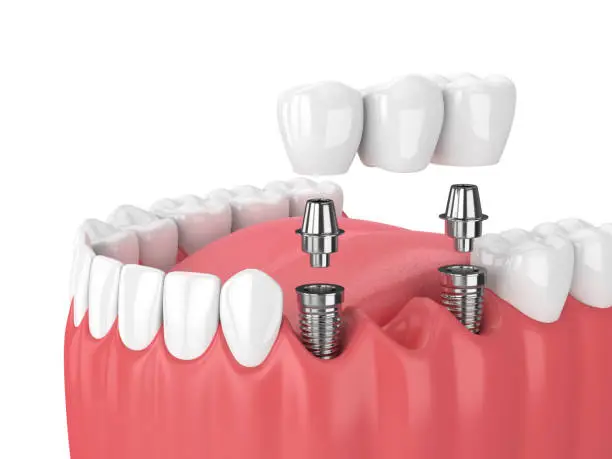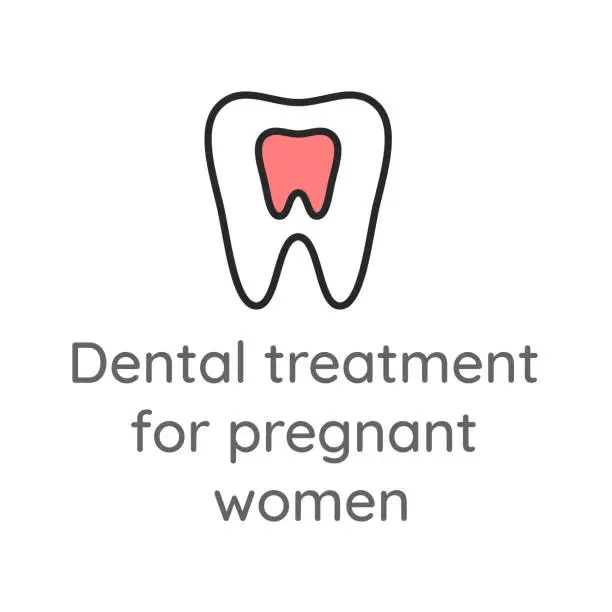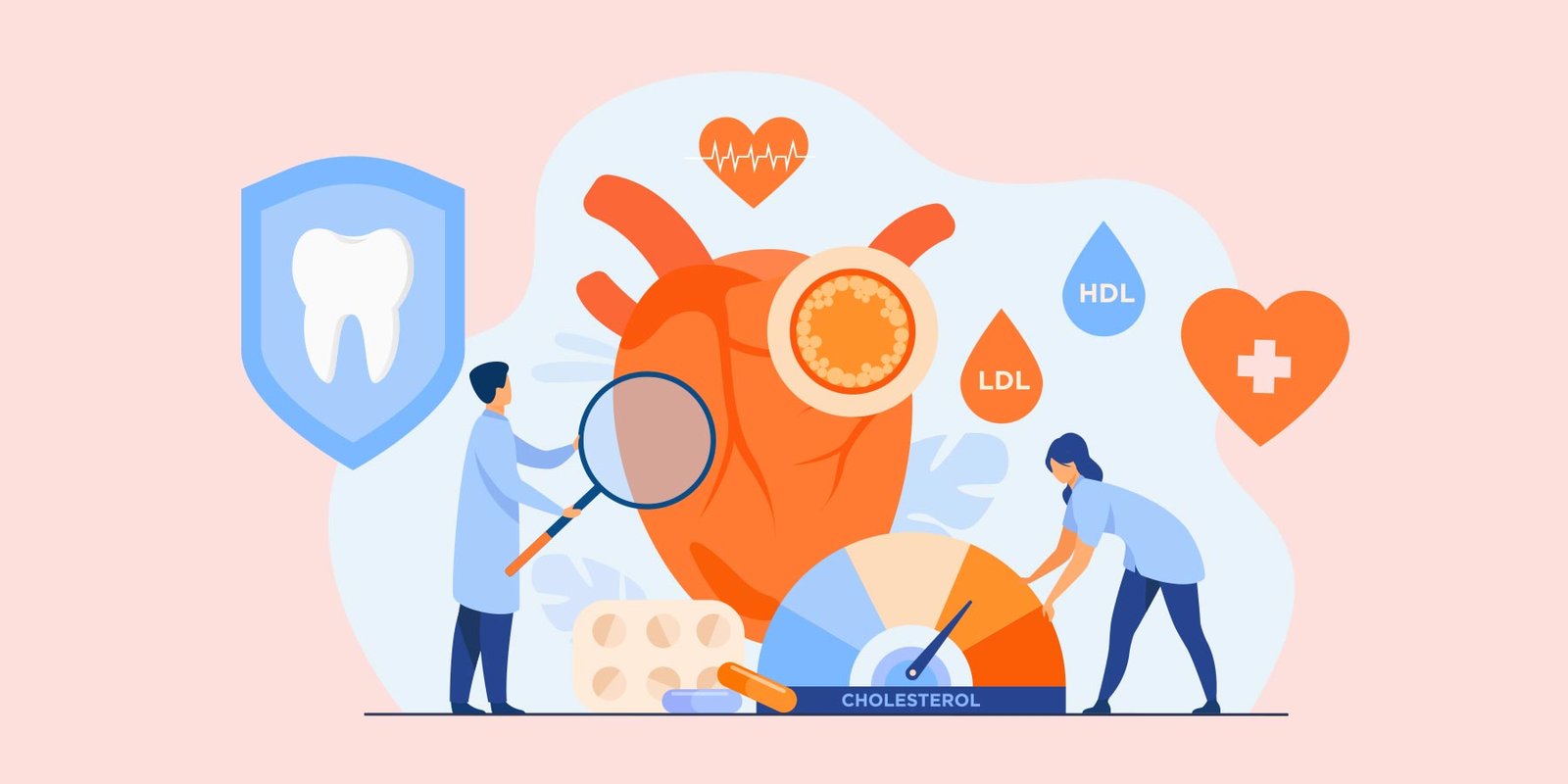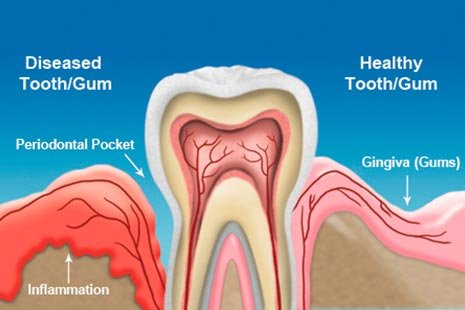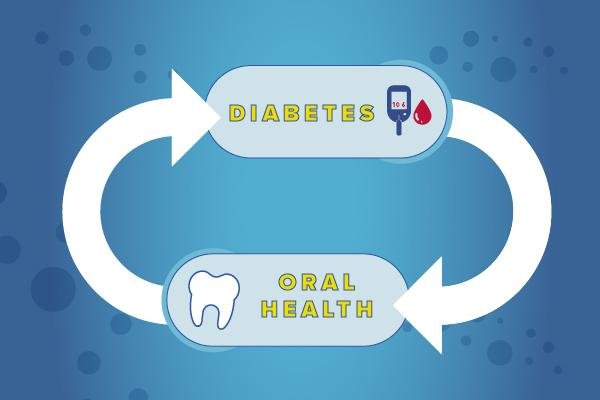Dental fluorosis is a change in the appearance of the tooth’s enamel. These changes can vary from barely noticeable white spots in mild forms to staining and pitting in the more severe forms. Dental fluorosis only occurs when younger children consume too much fluoride, from any source, over long periods when teeth are developing under the gums. develops dental fluorosis Only children aged 8 years and younger can develop dental fluorosis because this is when permanent teeth are developing under the gums. Once the teeth erupt through the gums and are in the mouth, they can no longer develop fluorosis. The teeth of children older than 8 years, adolescents, and adults cannot develop dental fluorosis. What does dental fluorosis look like? dental fluorosis look like: Very mild and mild forms of fluorosis—teeth have scattered white flecks, occasional white spots, frosty edges, or fine, lacy chalk-like lines. These changes are barely noticeable and difficult to see except by a dental health care professional. Moderate and severe forms of fluorosis—teeth have larger white spots and, in the rare, severe form, rough, pitted surfaces. What are the common sources of fluoride? common sources of fluoride: Toothpaste (if swallowed by young children). Drinking water in fluoridated communities. Beverages and food processed with fluoridated water. Dietary prescription supplements that include fluoride (e.g., tablets or drops). Other professional dental products (e.g., mouth rinses, gels, and foams). What health care and public health professionals can do to reduce the occurrence of fluorosis Counsel parents and caregivers regarding use of fluoride toothpaste by young children Parents or caregivers should be counseled on the use of fluoride toothpaste by young children, especially those younger than 2 years. There is an increased chance for fluorosis for children younger than 6 years, and especially for those younger than 2 years, because they are more likely to swallow the toothpaste than older children. For children younger than 2 years, you should consider the fluoride level in the community drinking water, other sources of fluoride, and factors likely to affect susceptibility to tooth decay when weighing the risk and benefits of using fluoride toothpaste. When assessing the risks and benefits, determine if the child may be at high risk for tooth decay because of factors such as poor hygiene, poor diet, or history of decay in the child, and in their siblings or parents. European Dental Center; best dental clinic in Jordan provide this information about dental fluorosis.
Bad breath, also known as halitosis, is a disturbing and unpleasant problem that all of us were confronted to it one day. In general, awful breath originates from the mouth (85-90%) from the tongue. Reasons for Bad Breath The most common reasons are caused by the food we are eating such as (garlic, cheese, onions, meat). obesity, smoking, and alcohol consumption It’s very normal to have “morning awful respiration; because during the night the mouth is exposed to less oxygen and is inactive. Sometimes after a simple tooth brushing, flossing, or rinsing with a mouthwash the respiration can disappear But sometimes, bad breath can be relentless (chronic bad) to some. People, meaning that regular cleaning are not enough to get rid of it This is a more serious condition, and it can negatively affect the individual’s personal, social, and business relationships, leading to poor self-esteem and increased stress. chronic bad breath The reasons of having a chronic awful respiration are multiple such as: bad restorations. plaque accumulation. periodontal disease. tooth abscess. Cysts. sinusitis gastric problems and much more. This will be determined during your first consultation. We will try to find the real cause of your problem and treat it. European Dental Center; best dental clinic in Jordan provide this information about Bad Breath reasons.
Tips for Brushing Your Teeth for Brushing Your Teeth; Follow these tips: Brushing your teeth for at least two minutes. Be sure to get under the wires. Thread the floss string and push it down under the wires between your brackets. Remember to floss every tooth, even the ones in the far back. Gently clean between brackets (under the wires) with the wire brush to get all the plaque off. Use mouthwash to clean your mouth, it will give you nice breath! Stick to foods that require little to no chewing once you first get braces: applesauce, mashed potatoes, soup. Persuade someone to take you out for milkshakes. Also, stay away from foods such as carrots as the pieces get stuck behind the wire and are a pain to get out. Warnings for Brushing Your Teeth Pay attention to these warnings: Don’t eat hard foods like hard taco shells, ice, nuts, Jolly Ranchers, bagels, chips, and apples and carrots unless cut into tiny bite size pieces. If you do not clean your teeth well enough, you may have squares on your teeth where your braces were so brush well! Be sure to stick to the diet your orthodontist recommends at first. Eventually, you will be able to break the rules every once in a while. Always wear the retainer that the orthodontist gives you when you get you braces off. If you don’t, your teeth will move and you might have to get braces again as an adult. If you eat really chewy foods & candies, they may get stuck underneath your braces, causing brown squares to be where the braces once were. European Dental Center; best dental clinic in Jordan provide this information about Brushing your teeth .
Crown or Bridge. Crowns are dental restorations that cover the entire tooth or dental implants. Crown is essential to protect teeth that have been damaged by significant decay, cavities, fractures, or even after root canal treatment. Crowns can be made from various materials such as ceramic, zirconia, porcelain-fused-to-metal, and gold. How Crowns or Bridges are Made? First, the damaged tooth structure is removed to provide enough space for the porcelain. Then, an impression of the prepared tooth is taken, which our dental laboratory technicians use to construct your crown during the fabrication stage. A temporary crown made of acrylic is then created to protect your tooth. The final crown is shaped to look natural, matching your adjacent teeth. It is then cemented onto your tooth with a special adhesive. Our cosmetic goal is to achieve a crown that appears to emerge from the gum line. Is it Better to Have a Bridge or an Implant? A bridge requires at least two healthy teeth to be anchored, and sometimes the removal of the nerve to replace missing teeth. Dental implants, on the other hand, replace the missing tooth without sacrificing the health of adjacent teeth. The advantage of dental implants is that they preserve the bone they are placed in. With a bridge, some of the bone used to support the tooth will begin to resorb and deteriorate. Dental implants integrate with the jawbone, helping to maintain bone health and integrity. A single implant can be more aesthetic and easier to keep clean than a bridge. Different Types of Crowns There are two main types of crowns, porcelain-fused-to-metal (PFM) crowns, and all-ceramic crowns. PFM crowns are made of a metal inner core covered by a layer of ceramic. Although we use metal underneath the ceramic, we can still match the color of your adjacent teeth and make them look like natural teeth. However, if the gum recedes, which is very common, the metal underneath the crown may show and leave a dark line on the gum. These crowns are primarily a good option for back teeth. All-ceramic crowns or porcelain crowns are used today to provide our patients with the best aesthetic and natural color compared to any other type of crown. They are also referred to for those who have metal allergies. Metal-free crowns are an excellent choice for both front and back teeth. A new type of material called “zirconia” is used to build metal-free crowns or bridges, developed in recent years to increase the strength of all-ceramic crowns. It is stronger than porcelain-fused-to-metal crowns and nearly unbreakable. It is also recommended for people with grinding issues. The most significant advantage of zirconia crowns is their versatility in use for both back and front teeth. European Dental Center; best dental clinic in Jordan provide this information about Crown or Bridge!.
Pregnancy and dental heath Pregnancy and dental heath; For most women, routine dental visits are safe during pregnancy, but be sure to let your dental office know what stage of pregnancy you are in when you make your appointment. Changes in your mouth During pregnancy some women may find they are prone to pregnancy gingivitis mild form of gum disease that causes gums to be red, tender, and sore. You can prevent gingivitis by keeping your teeth clean. Your dentist may recommend more frequent cleanings to help control gingivitis. Diet for Pregnant your diet matters especially vitamins A, C, and D, protein, calcium and phosphorous. While it’s normal for pregnant woman to have the desire to eat more, frequent snacking can be an invitation to tooth decay. When you do snack, choose foods that are low in sugar and nutritious for you and your baby such as raw fruits and vegetables After your baby is born Continue taking care of your mouth and your baby’s mouth, too. Although newborns usually have no visible teeth, most baby teeth begin to appear generally about six months after birth. Begin cleaning your baby’s mouth during the first few days after birth by wiping the gums with a clean, moist gauze pad or washcloth. As soon as teeth appear, decay can occur. European Dental Center; best dental clinic in Jordan provide this information about Pregnancy and dental heath.
Some Blood Pressure Medications May Affect Your Oral Health; If you’re taking medication to regulate your blood pressure. you may be familiar with some of the general side effects, like nausea, drowsiness or dizziness. But some blood pressure drugs might also cause complications with your oral health. Some Blood Pressure Medications May Affect Your Oral Health One class of drugs, particularly used for blood pressure regulation, demonstrates this truth. People use calcium channel blockers (CCBs) to regulate blood pressure by dilating (relaxing) blood vessels, which makes it easier for the heart to pump blood. Doctors often prescribe them to patients who can’t tolerate beta blockers, another common blood pressure drug. Besides other general side effects. CCBs can also cause gingival hyperplasia (gum overgrowth) and mouth dryness. The former condition occurs when the gum tissues grow and extend beyond their normal size over the teeth. Besides pain and discomfort, hyperplasia creates an abnormal appearance which can be embarrassing. Poor hygiene habits, which give rise to periodontal (gum) disease, are also associated with hyperplasia development from CCB use, as indicated by research findings. A condition of less than normal saliva flow defines mouth dryness. Besides discomfort, the condition may increase your risk of dental disease. saliva is a key part in keeping bacterial levels low and maintaining the mineral content of enamel. Inadequate saliva flow can’t maintain this balance. which increases the bacterial population in the mouth and the risk of infection leading to gum disease or tooth decay. Avoid Blood Pressure Medications May Affect Your Oral Health To avoid both of these side effects. you may need more frequent dental visits. especially if you’re displaying symptoms of dental disease. Studies have found that frequent dental visits to remove bacterial plaque. and (hardened plaque deposits) may significantly reduce gum overgrowth in patients taking a CCB. You should also maintain a recommended daily regimen of oral hygiene brushing and flossing)). this information from European Dental Center, best dental center in Jordan.
Four out of five people have periodontitis gum disease and don’t know it! Most people are not aware of it because the disease is usually painless in the early stages. Unlike tooth decay, which often causes discomfort, it is possible to have periodontal disease without noticeable symptoms. Having regular dental check-ups and periodontal examinations are very important and will help detect if periodontal problems exist. periodontitis gum disease periodontitis gum disease begins when plaque, a sticky, colorless, film of bacteria, food debris, and saliva, is left on the teeth and gums. The bacteria produce toxins (acids) that inflame the gums and slowly destroy the bone. Brushing and flossing regularly and properly will ensure that plaque is not left behind to do its damage. Other than poor oral hygiene, there are several other factors that may increase the risk of developing periodontal disease: Smoking or chewing tobacco – Tobacco users are more likely than nonusers to form plaque and tartar on their teeth. Certain tooth or appliance conditions – Bridges that no longer fit properly, crowded teeth, or defective fillings that may trap plaque and bacteria. Many medications – Steroids, cancer therapy drugs, blood pressure meds, oral contraceptives. Some medications have side effects that reduce saliva, making the mouth dry and plaque easier to adhere to the teeth and gums. Pregnancy, oral contraceptives, and puberty – Can cause changes in hormone levels, causing gum tissue to become more sensitive to bacteria toxins. Systemic diseases – Diabetes, blood cell disorders, HIV / AIDS, etc. Genetics may play role – Some patients may be predisposed to a more aggressive type of periodontitis. Patients with a family history of tooth loss should pay particular attention to their gums. Symptoms of Periodontal Disease Sign and symptoms of periodontitis gum disease include:
Diabetes and proper dental care; If you have diabetes, it is more important than ever to take your dental care seriously and practice excellent oral hygiene. Diabetes and proper dental care These recommendations will help for Diabetes and proper dental care: Manage your diabetes First and foremost, it is vital to control your high blood sugar in accordance with your physician’s instructions — not only for the sake of your oral health, but your overall health. With properly controlled blood sugar, you reduce your risk of developing gingivitis and other oral health issues. Practice good at-home oral hygiene This means brushing at least twice a day AND flossing. At a minimum, brush your teeth in the morning and at night, but after meals and snacks if you can. Use a soft toothbrush to avoid injuring your gums. Don’t neglect flossing; because it helps to remove plaque below the gum line and between teeth. Visit the dentist regularly While it is important to see the dentist every six months even if you don’t have diabetes, it is even more crucial to have a professional teeth cleaning and dental exam if you have the disease. Tell your dentist that you have diabetes If you were recently diagnosed with diabetes, be sure to let us know as soon as possible, and remind us at every appointment Managing diabetes takes effort, not only in watching your diet, exercising, monitoring your blood sugar levels, and taking your medication, but obtaining proper dental care. At European Dental Center, we combine cutting-edge technology with compassionate care to deliver exceptional dental experiences. Whether seeking routine checkups, advanced procedures, or a complete smile makeover, trust us to be your partner in oral health. Watch video from here. from the best dental center in Jordan.



